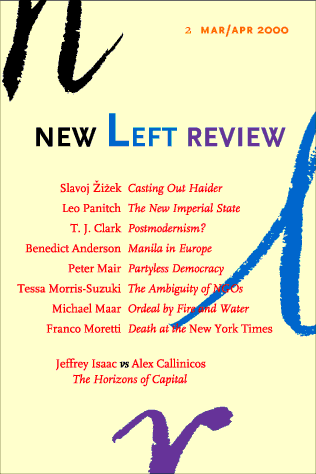Globalization is the watchword of the moment. Does it mean the irresistible sway of markets over states—or are welfare regimes in Europe or dirigiste governments in East Asia still potentially robust? Neither, Leo Panitch argues: the reality is an unprecedented dominance of the United States over world capital flows and allied political systems alike.
New Labour’s rule in the UK is often held to offer a paradox: devolution of power to regions and cities, concentration of power in the central executive and support structures. Peter Mair suggests there is no contradiction—Blair’s project is a ‘consensual’ system above politics, gutted of traditional parties.
What is the significance of the EU’s boycott of the new Austrian government? Beyond the Tartuffery of official reactions to Haider in the West, Slavoj Žižek dissects the political function of the new rectitudes of the Third Way.
The astonishing feat of a 23-year-old Filipino folklorist who took the newly invented discipline by storm under Spanish rule. What did patriotism mean for an Ilocano before modern nationalism; how many discrepant voices could an overseas enlightenment release?
Non-governmental organizations have taken over from social movements as candidates for progressive activism. Tessa Morris-Suzuki looks at the theory behind them, and the practice of their roles in Asia and Australia, with a view to a critical politics of the ‘lived world’.
Postmodernism is typically seen as a recent sequel to modernism. T. J. Clark queries Perry Anderson’s account of the break between them, and concludes that there is more continuity of conditions than meets the eye. It may be too soon to judge whether modernism has passed.
Reflections on the difference between reading a novel for the first and for the second time. Proust, Mann, Joyce, Kafka—how do they stand the two tests of a fervent discovery and a cool deconstruction, and what is the relationship between the two?
What do the obituaries in Manhattan’s leading daily tell us about the nervous system of America’s liberal democracy? The filters and foibles of the success story as a grid for social memory.
Responding to Callinicos’s critique of Giddens and Bourdieu, Jeffrey Isaac attacks the idea that it is possible to reject capitalism today.
Replying to Jeffrey Isaac, Alex Callinicos doubts that world history has thrown in its hand so quickly.
Taking up John Roberts’s account of the new Danish cinema, Tabish Khair argues that Von Trier’s films share with Benigni’s prize-puller rotations between the playful and the real, stock tropes of the postmodern.
Tariq Ali on John Cooley, Unholy Wars, and Ahmed Rashid, Taliban. How the US fought its proxy war in Afghanistan, and what kind of Islamist regime has resulted.
Henry Zhao on Geremie Barmé, In the Red. The sweeping cultural changes of contemporary China, and the way intellectuals have reacted to them.
John Armitage on Paul Virilio, La bombe informatique. The latest projectile of France’s radical theorist of speed.
Göran Therborn on Noel Parker, Revolutions and History, and Fred Halliday, Revolution and World Politics. Two new contributions to the literature on revolution—where does it stand today?
Russell Jacoby on Guy Oakes and Arthur Vidich, Collaboration, Reputation and Ethics in American Academic Life. The relationship between Gerth and Mills in the retrospect of orthodox sociology.
